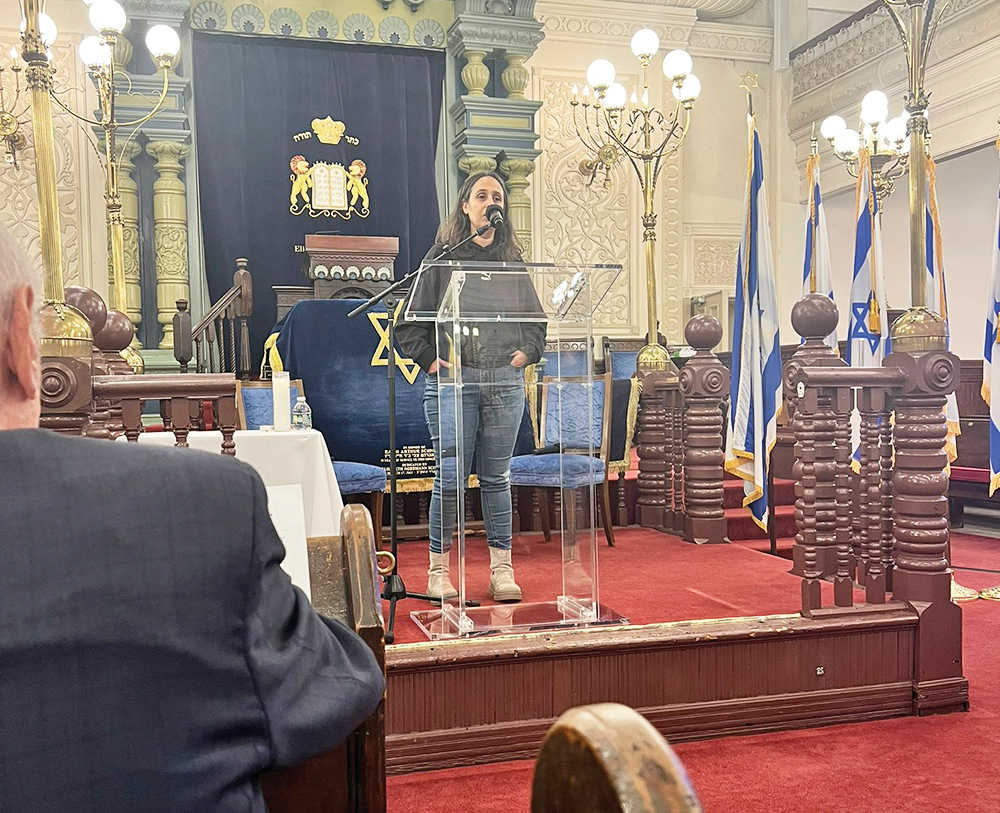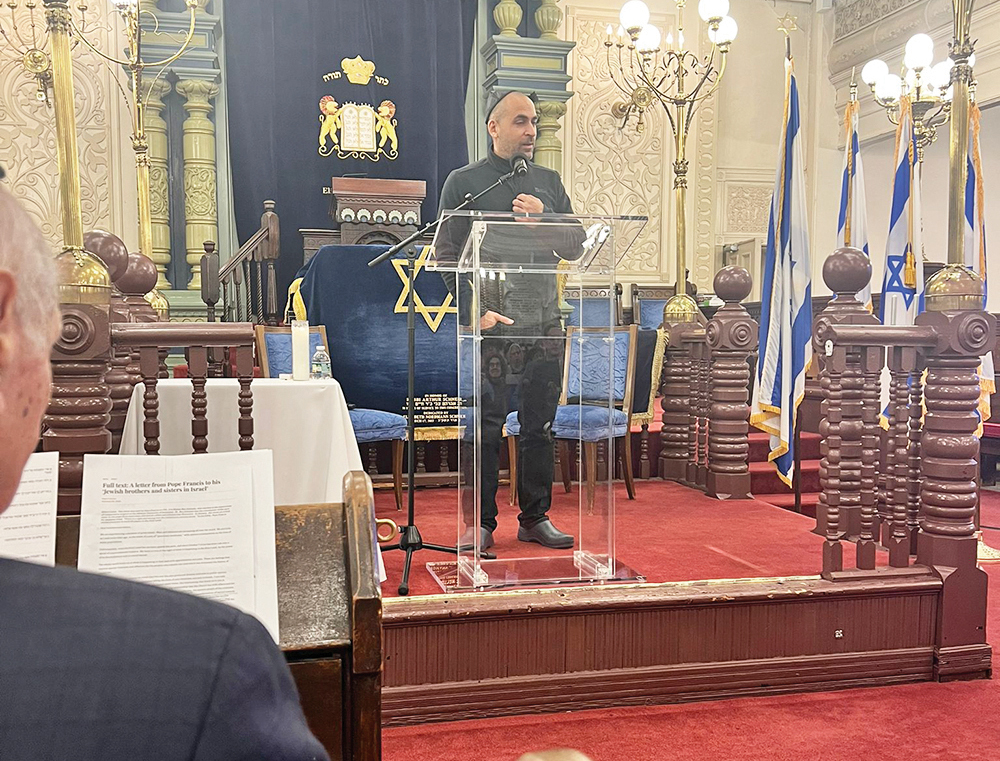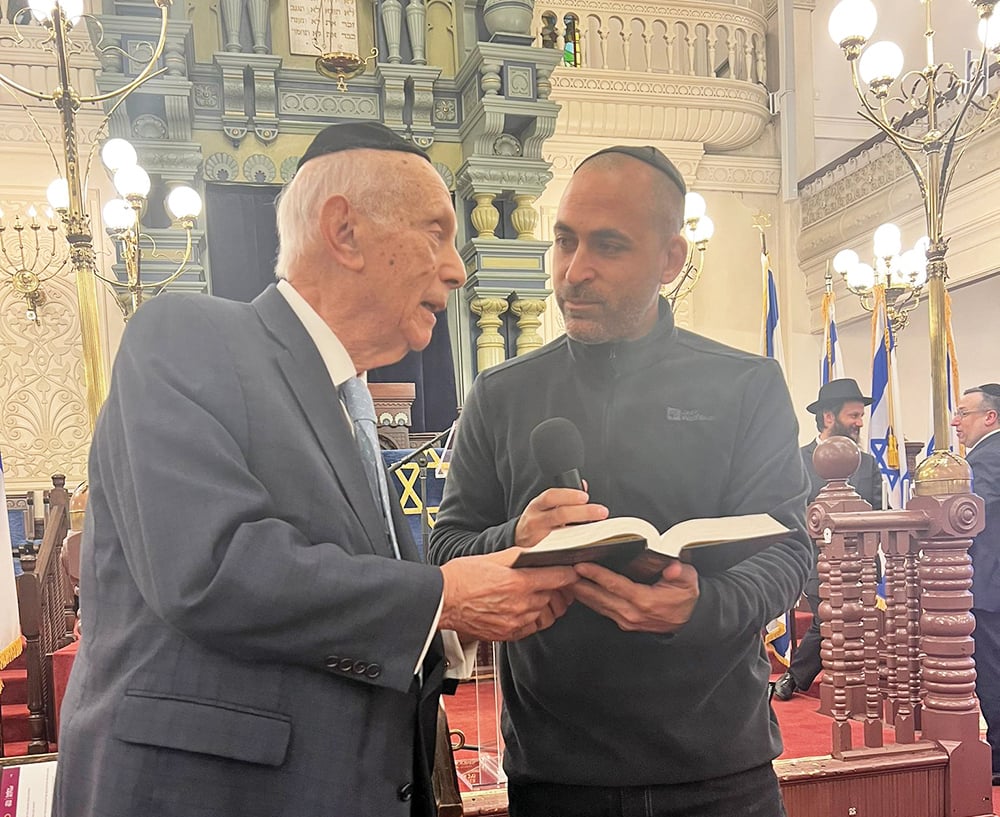
On Thursday evening, February 8, the pews in the sanctuary of Park East Synagogue were filled with those eagerly waiting to hear from Hagar and Avichai Brodutch. The Brodutch family is visiting the United States from Israel to tell their heart-wrenching story in the aftermath of the horrific events of October 7. Hagar was held captive by Hamas, along with her three children and one other child, for a total of 51 days, while her husband, Avichai, was recovering from wounds sustained in the fight with Hamas terrorists in their town of Kfar Aza. The evening, which was organized by the Chabad Israel Center of the Upper East Side, the nonprofit organization Belev Echad and Park East Synagogue, was a true roller coaster of emotions, both terrifying and heartwarming.
The event was moderated by Rabbi Uriel Vigler, the rabbi at the Chabad Israel Center and the founder and director of Belev Echad, a nonprofit supporting wounded IDF soldiers and veterans. Rabbi Vigler began the evening with prayers for fallen soldiers and reciting Tehillim 120-121 in unison with the attendees, before introducing Rabbi Arther Schneier of Park East Synagogue. Rabbi Schneier made a rousing speech about the recent support that Israel has received from leaders around the world, noting that “we need as many allies as we can,” especially as the nation awaits the return of the remaining hostages.
Everyone was silent as Hagar Brodutch approached the podium to share her story. With a lump in her throat, Hagar painfully recounted the events of her captivity, beginning all the way back to when her family first moved to Kfar Aza in 2014. “We lived like royalty,” she recalled, “we loved it there.” On October 6, just hours before Hamas terrorists infiltrated, the Brodutch family celebrated Ofri’s 10th birthday with family and friends—but little did they know the horrors that were to come.

“We always thought that no matter what, we were okay,” Hagar shared.
“But on [October 7], we were not okay.”
As the commotion began, Hagar ran with her three children to the safe room as Avichai, a civil guard, headed to the armory to retrieve his gun. On his way out, Avichai encountered Avigail, a young girl who lived next door. Avigail was covered in blood, apparently having just witnessed her parents murdered by terrorists. Avigail joined Hagar and the Brodutch children in the safe room, where they all remained for four hours with no knowledge of what was happening to their kibbutz.
The infiltrating terrorists eventually broke into the Brodutch home, and while Hagar tried to fight them off, they eventually succeeded in taking her and the children to Gaza, where “everyone was cheering” upon their arrival. Hagar and the kids were taken to someone’s home and locked in a room for approximately two weeks until the IDF targeted the building for suspected terrorist activity. They were then transported to another home, where they were guarded by three terrorists at all times. During this entire period, Hagar was pained by a deep sense of loneliness, not only because she and her family remained in captivity for much longer than she would have expected, but also because she was certain that Avichai was dead.
“For 51 days, I thought my husband was dead. For 51 days, my kids didn’t know what happened to their family,” she recalled through tears. “We just didn’t know if anyone cared about us. You lose hope after waiting for so long.” Finally, after those grueling 51 days, Hagar and the children were returned to Israel—with the moving realization that Avichai was still alive and waiting for them.
Avichai then took his wife’s place at the podium to tell his version of events. Before beginning, he noted that he is still uncovering the details of Hagar’s captivity, slowly collecting the stories from the nearly two months they were apart. “I will hear more stories as time goes on,” he said.
Avichai began his recollection of the morning of October 7, explaining that his first reaction to sirens and missiles was to run to the armory to retrieve his gun and fulfill his duties as a civil guard on the kibbutz. Though the distance to the armory was only two minutes, the Hamas terrorists managed to do a lot of damage both on the way and in the actual armory, having stationed themselves in anticipation of the 14 civil guards who would come to protect Kfar Aza. Of the 14 guards, seven were killed and three were injured, including Avichai, who was critically wounded by an RPG during an active pursuit by the terrorists. “Eventually, they got tired of me,” he recalled. Avichai was left unable to walk, and was found later by police, who evacuated him to the hospital via helicopter.
After spending several days recovering in the hospital, Avichai learned the tragic reality: that his wife and children were being held captive by Hamas. “I started to lose hope for my country,” he shared. “Pidyon shvuyim (releasing captives) is one of the biggest mitzvot…and no one was doing anything.”

Avichai then decided to do something about it himself. He drew up a poster that stated “My Family is in Gaza,” and had his brother drive him to the Defense Ministry in Tel Aviv. While camped out in front of the building holding the sign, strangers began to approach him and ask about his story. He shared about Hagar and his three children, and about Avigail who was also a hostage, and people really felt for him. Avichai said, “After that, people really started realizing what was going on.” Avichai publicized his plight on the internet and his post went viral.
It took 48 days for the first hostages to be released from Gaza—48 long days filled with prayer, rallies and endless pushing of the Israeli government to bring them home. Finally, just a few days after that, Avichai was reunited with his family. “I don’t think anyone loved [Kfar Aza] more than us,” he said, “but there are so many painful memories now that I don’t think we would want to go back.” A stranger in Herzliya offered her vacant home to the Brodutch family for them to utilize as long as they needed, and the surrounding community members not only furnished the home, but retrieved artwork and personal belongings from the Brodutch home in Kfar Aza to make them feel more comfortable. The community also stocked the fridge with meals, a miraculous contrast to the daily singular pita that Hagar and her children received from Hamas while in captivity.
Avichai stated that he hopes the spirit of unity, both in Israel and abroad, will continue beyond the hostage crisis and the ongoing war. “We don’t need misery to be together; we should all support one another all the time.”
Rabbi Vigler followed Avichai’s emotional talk with a vort for Rosh Chodesh Adar I, which began that evening. Rabbi Schneier then invited Avichai to the front of the sanctuary once again, this time to recite Birkat HaGomel for himself and his family. By the end of the evening, there was not a dry eye left in the room.
“I was in Kfar Aza myself in December, and I met some of the hostages … I saw how much people wanted to hear their stories,” said Rabbi Vigler, who coordinated the Brodutches’ visit to the United States. “I reached out to Avichai, who immediately agreed to come, specifically as a way to get his family to go on vacation.”
Rabbi Vigler explained that the Chabad Israel Center has a strong ongoing relationship with Park East Synagogue, and the partnership for this event was a no-brainer. “The synagogue has always stood with Israel,” Cantor Benny Rogosnitzky of Park East shared with The Jewish Link. “To be able to do something like this, as we pray for the hostages, to actually have them here, is a miracle we don’t often get to see.”
As Avichai noted to the audience with his final words: “The mission here is to bring the hostages home.” His mission has been heard loud and clear.












